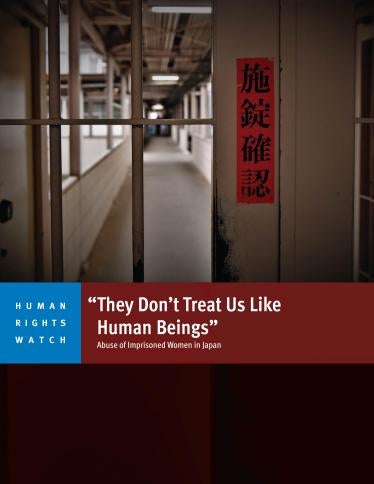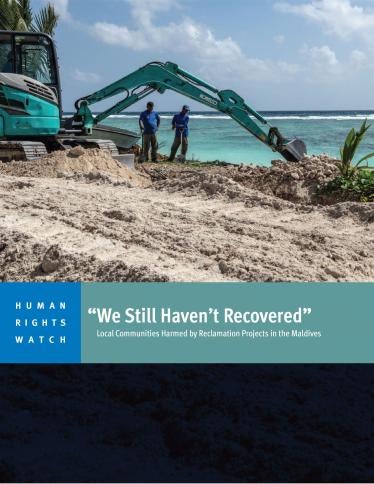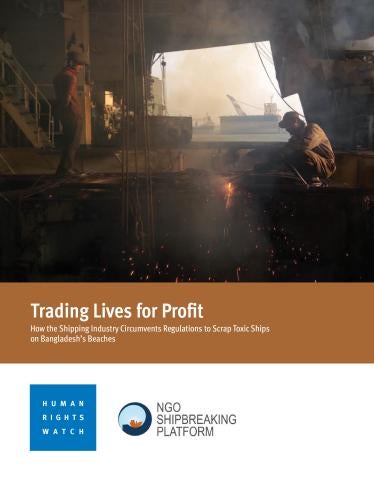“Schools are Failing Boys Too”
The Taliban’s Impact on Boys’ Education in Afghanistan
The Taliban’s Impact on Boys’ Education in Afghanistan
The 76-page report, “‘They Don’t Treat Us like Human Beings’: Abuse of Imprisoned Women in Japan,” documents the abusive conditions in many women’s prisons in Japan. Government policies towards women in prison violate international human rights conventions and contravene international standards such as the United Nations Standard Minimum Rules of the Treatment of Prisoners, known as the Mandela Rules. Prison authorities use restraints on imprisoned pregnant women, arbitrarily employ solitary confinement as a form of punishment, verbally abuse women in prison, deny incarcerated women’s opportunities to parent their child in prison, and fail to provide adequate access to health and mental health care.

The 21-page report, “‘We Still Haven’t Recovered’: Local Communities Harmed by Reclamation Projects in the Maldives,” documents how the Maldives government has failed to consult local communities ahead of development projects, heed environmental impact assessment (EIA) mitigation requirements, and provide resources for ongoing monitoring of development projects in the northern island of Kulhudhuffushi and the southern atoll of Addu. These deficiencies have further harmed residents already at risk from the effects of changing weather patterns and rising sea levels, loss of biodiversity, coastal erosion, and increased flooding.

The 90-page report, “Trading Lives for Profit: How the Shipping Industry Circumvents Regulations to Scrap Toxic Ships on Bangladesh’s Beaches” finds that Bangladeshi shipbreaking yards often take shortcuts on safety measures, dump toxic waste directly onto the beach and the surrounding environment, and deny workers living wages, rest, or compensation in case of injuries. The report reveals an entire network used by shipowners to circumvent international regulations prohibiting the export of ships to facilities like those in Bangladesh that do not have adequate environmental or labor protections.

The 39-page report, “‘If We Raise Our Voice They Arrest Us’: Sri Lanka’s Proposed Truth and Reconciliation Commission,” documents abusive security force surveillance and intimidation of activists and campaigners from minority Tamil families of those who “disappeared” during Sri Lanka’s civil war. The authorities are using draconian counterterrorism laws to silence dissenting voices, including those calling for truth and accountability, while government-backed land grabs target Tamil and Muslim communities and their places of worship.
The 82-page report “‘No Internet Means No Work, No Pay, No Food’: Internet Shutdowns Deny Access to Basic Rights in ‘Digital India,’” finds that internet shutdowns impair essential activities and adversely affect economic, social and cultural rights under Indian and international human rights law. Indian authorities, in the name of maintaining public order, have ignored Supreme Court orders setting out procedural safeguards to ensure that internet suspensions are lawful, necessary, proportionate, and limited in scope and territory. Decisions by central and state government authorities to disrupt internet access are often erratic and unlawful, and are used for restricting protests and preventing cheating in examinations.
The 39-page report, “‘Our Numbers are Dwindling’: Myanmar’s Post-Coup Crackdown on Lawyers,” examines the junta authorities’ pattern of harassment, surveillance, arrests, and in some cases torture of lawyers since the coup, particularly those taking on political cases. At least 32 lawyers have been arrested and placed in pretrial detention with little evidence supporting the charges against them, according to the Assistance Association for Political Prisoners.
The 101-page report, “Japan’s ‘Hostage Justice’ System,” documents the abusive treatment of criminal suspects in pretrial detention. The authorities strip suspects of their right to remain silent, question them without a lawyer, coerce them to confess through repeated arrests and denial of bail, and detain them for prolonged periods under constant surveillance in police stations. The Japanese government should urgently undertake wide-ranging reforms, including amending the criminal procedure code, to ensure detainees their fair trial rights and make investigators and prosecutors more accountable.
The 55-page report, “A Nightmare for Everyone: The Health Care Crisis in Pakistan’s Prisons,” documents widespread deficiencies in prison health care in Pakistan and the consequences for a total prison population of more than 88,000 people. Pakistan has one of the world’s most overcrowded prison systems, with cells designed for a maximum of 3 people holding up to 15. Severe overcrowding has compounded existing health care deficiencies, leaving inmates vulnerable to communicable diseases and unable to get medicines and treatment for even basic health needs, as well as emergencies.
The 97-page report, “Only ‘Instant Noodle’ Unions Survive: Union Busting in Cambodia’s Garment and Tourism Sectors,” documents how the Cambodian government and some employers have used various legal and administrative tactics during the Covid-19 pandemic to weaken Cambodia’s independent union movement and violate workers’ rights. Measures adopted to address the severe economic impacts of the pandemic have punished independent unions while benefitting employer-friendly unions, which could register quickly with the government, like “making instant noodles,” in the words of a prominent union leader.
The 56-page report, “‘I Could Have Been Next’: Stymied Reforms in the Maldives,” finds that the Solih administration, more than halfway into its five-year term, has not fulfilled election promises to reform the criminal justice system to address threats to free expression. The government has reduced its repression of free speech and the media, so reporters say they no longer fear state censorship or worry about facing criminal cases or fines for doing their jobs. Yet, the government has often relented to pressure from politicians and powerful religious groups, instead of upholding free speech and association
The 65-page report, “Locked Inside Our Home: Movement Restrictions on Rights Activists in Vietnam,” documents the Vietnamese government’s routine violation of the right to freedom of movement and other basic rights by subjecting activists, dissidents, human rights defenders, and others to indefinite house arrest, harassment, and other forms of detention. The authorities have detained activists just long enough to prevent them from attending protests, criminal trials, meetings with foreign diplomats and a US president, and other events.
The 59-page report, ‘“In a Legal Black Hole’: Sri Lanka’s Failure to Reform the Prevention of Terrorism Act,” documents the Gotabaya Rajapaksa administration’s misuse of the PTA against the minority Tamil and Muslim communities, and to suppress civil society groups. The administration rejected pledges by the previous government to repeal the law after it was readmitted to the EU’s Generalized Scheme of Preferences plus (GSP+), which grants Sri Lanka special tariff-free access to EU markets.
The 43-page report, “‘Even If You Go to the Skies, We’ll Find You’: LGBT People in Afghanistan After the Taliban Takeover,” is based on 60 interviews with LGBT Afghans. Many reported that Taliban members attacked or threatened them because of their sexual orientation or gender identity. Others reported abuse from family members, neighbors, and romantic partners who now support the Taliban or believed they had to act against LGBT people close to them to ensure their own safety. Some fled their homes from attacks by Taliban members or supporters pursuing them. Others watched lives they had carefully built over the years disappear overnight and found themselves at risk of being targeted at any time because of their sexual orientation or gender identity.
The 76-page report, “‘I Thought of Myself as Defective’: Neglecting the Rights of LGBT Youth in South Korean Schools,” finds that bullying and harassment, a lack of confidential mental health support, exclusion from school curricula, and gender identity discrimination are particularly pressing concerns for LGBT students. The South Korean government should implement antidiscrimination protections and ensure that LGBT youth have supportive resources to safeguard their health and education